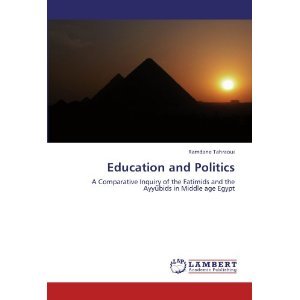Tahraoui, Ramdane (2011) Education and politics : a comparative inquiry of the Fatimids and the Ayyūbids in Middle age Egypt. LAP LAMBERT Academic Publishing , Germany. ISBN ISBN-10: 3846593575 ISBN-13: 978-3846593578
![[img]](http://irep.iium.edu.my/28764/1.hassmallThumbnailVersion/Education_and_Politics.jpg)
|
PDF
Download (8kB) | Preview |
Abstract
Education is the key to people’s minds, because it directs their inclinations and preferences, to the extent that the one who controls education can actually control people. This study is associated with this spectrum as it will investigate the relationship between education and politics and identify the double role of education as a politicising and a politicised factor in the two consecutive eras of the Fatimids and the Ayyūbids in Egypt. The researcher selected the Fatimid and Ayyūbid periods in Egypt as a focus for his investigation because these two periods constituted the most important episodes in Islamic history, where education and politics influenced each other. The impact of that influence was clear through the course and the sequence of the historical events in those two stages. This research is an attempt to open a small window on the great legacy of Islamic educational thought in the Middle-ages, which could contribute to the efforts of reviving the Islamic educational heritage. The research tried to lay foundations for a solid intellectual platform that aims to create a modern Islamic system of education that it is comprehensive, responsive to our current needs. To serve the purpose of this research, a causal assessment method has been utilized in order to analyze the educational and political experience of the Fatimid and Ayyūbid states on one hand, and to avoid the simplistic description which does not add any substantial information on the other hand. The study also tried to address all aspects which reflect the relationship of education with politics, through the analysis of the historical and religious circumstances that led to the establishment of the Fatimid then Ayyūbid states, with special focus on the analysis of the educational practices prevailing at the time. The study highlights the special attention that the rulers in both periods accorded to learning and learners, and it tries to reveal the political and religious motives of that patronage. In the end, the study concludes that despite the existing political and religious affiliations of each regime, formal and informal institutions of education in both periods were arenas in which power and politics received fundamental expression. This does not necessarily mean that the politicization of education during those two phases have restricted the thought and prevented it from flourishing. On the contrary, learning was accessible for all and absolutely free in both periods. Students received stipends provided by abundant income from a chain of a deeply embedded institution in the thoughts and practices of medieval Islamic societies called waqf. The religious motive was fundamental in the functioning of Islamic medieval educational process and the ultimate role of education in both, Fatimid and Ayyūbid periods was the preservation of the Islamic faith and sharī’ah. This is the spirit that should be motivating any contemporary Islamic educational project.
| Item Type: | Book |
|---|---|
| Subjects: | L Education > L Education (General) L Education > LA History of education |
| Kulliyyahs/Centres/Divisions/Institutes (Can select more than one option. Press CONTROL button): | Kulliyyah of Education |
| Depositing User: | Dr Ramdane Tahraoui |
| Date Deposited: | 24 Apr 2013 10:56 |
| Last Modified: | 24 Apr 2013 10:56 |
| URI: | http://irep.iium.edu.my/id/eprint/28764 |
Actions (login required)
 |
View Item |


 Download Statistics
Download Statistics Download Statistics
Download Statistics